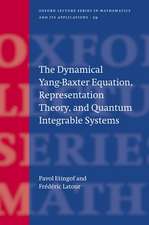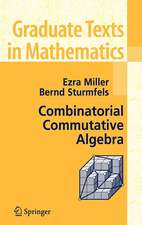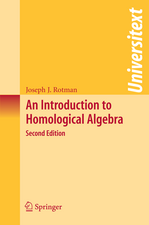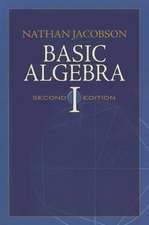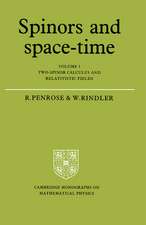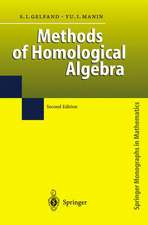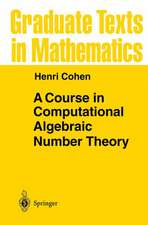Fuzzy Semigroups: Studies in Fuzziness and Soft Computing, cartea 131
Autor John N. Mordeson, Davender S. Malik, Nobuaki Kurokien Limba Engleză Hardback – 10 iul 2003
| Toate formatele și edițiile | Preț | Express |
|---|---|---|
| Paperback (1) | 1000.70 lei 6-8 săpt. | |
| Springer Berlin, Heidelberg – 5 dec 2010 | 1000.70 lei 6-8 săpt. | |
| Hardback (1) | 1006.87 lei 6-8 săpt. | |
| Springer Berlin, Heidelberg – 10 iul 2003 | 1006.87 lei 6-8 săpt. |
Din seria Studies in Fuzziness and Soft Computing
- 20%
 Preț: 999.85 lei
Preț: 999.85 lei - 20%
 Preț: 653.06 lei
Preț: 653.06 lei - 20%
 Preț: 872.96 lei
Preț: 872.96 lei - 20%
 Preț: 930.57 lei
Preț: 930.57 lei - 20%
 Preț: 1051.00 lei
Preț: 1051.00 lei - 20%
 Preț: 992.44 lei
Preț: 992.44 lei - 20%
 Preț: 655.85 lei
Preț: 655.85 lei - 20%
 Preț: 1001.86 lei
Preț: 1001.86 lei - 18%
 Preț: 954.14 lei
Preț: 954.14 lei - 20%
 Preț: 330.10 lei
Preț: 330.10 lei - 20%
 Preț: 333.04 lei
Preț: 333.04 lei - 20%
 Preț: 997.56 lei
Preț: 997.56 lei -
 Preț: 391.61 lei
Preț: 391.61 lei - 20%
 Preț: 647.79 lei
Preț: 647.79 lei - 20%
 Preț: 986.01 lei
Preț: 986.01 lei - 18%
 Preț: 958.56 lei
Preț: 958.56 lei - 20%
 Preț: 996.40 lei
Preț: 996.40 lei - 20%
 Preț: 999.35 lei
Preț: 999.35 lei - 15%
 Preț: 646.43 lei
Preț: 646.43 lei - 20%
 Preț: 651.57 lei
Preț: 651.57 lei - 20%
 Preț: 997.89 lei
Preț: 997.89 lei - 15%
 Preț: 641.03 lei
Preț: 641.03 lei - 20%
 Preț: 1009.74 lei
Preț: 1009.74 lei - 20%
 Preț: 992.62 lei
Preț: 992.62 lei -
 Preț: 388.72 lei
Preț: 388.72 lei - 18%
 Preț: 1223.43 lei
Preț: 1223.43 lei - 20%
 Preț: 651.42 lei
Preț: 651.42 lei - 18%
 Preț: 951.59 lei
Preț: 951.59 lei - 18%
 Preț: 948.61 lei
Preț: 948.61 lei
Preț: 1006.87 lei
Preț vechi: 1227.88 lei
-18% Nou
Puncte Express: 1510
Preț estimativ în valută:
192.67€ • 201.67$ • 160.36£
192.67€ • 201.67$ • 160.36£
Carte tipărită la comandă
Livrare economică 31 martie-14 aprilie
Preluare comenzi: 021 569.72.76
Specificații
ISBN-13: 9783540032434
ISBN-10: 3540032436
Pagini: 332
Ilustrații: IX, 319 p. 1 illus.
Dimensiuni: 155 x 235 x 23 mm
Greutate: 0.64 kg
Ediția:2003
Editura: Springer Berlin, Heidelberg
Colecția Springer
Seria Studies in Fuzziness and Soft Computing
Locul publicării:Berlin, Heidelberg, Germany
ISBN-10: 3540032436
Pagini: 332
Ilustrații: IX, 319 p. 1 illus.
Dimensiuni: 155 x 235 x 23 mm
Greutate: 0.64 kg
Ediția:2003
Editura: Springer Berlin, Heidelberg
Colecția Springer
Seria Studies in Fuzziness and Soft Computing
Locul publicării:Berlin, Heidelberg, Germany
Public țintă
ResearchCuprins
1 Introduction.- 1.1 Notation.- 1.2 Relations.- 1.3 Functions.- 1.4 Fuzzy Subsets.- 1.5 Semigroups.- 1.6 Codes.- 1.7 Finite-State Machines.- 1.8 Finite-State Automata.- 1.9 Languages and Grammars.- 1.10 Nondeterministic Finite-State Automata.- 1.11 Relationships Between Languages and Automata.- 2 Fuzzy Ideals.- 2.1 Introduction.- 2.2 Ideals in Semigroups.- 2.3 Fuzzy Ideals in Semigroups.- 2.4 Fuzzy Bi-ideals in Semigroups.- 2.5 Fuzzy Interior Ideals in Semigroups.- 2.6 Fuzzy Quasi-ideals in Semigroups.- 2.7 Fuzzy Generalized Bi-ideals in Semigroups.- 2.8 Fuzzy Ideals Generated by Fuzzy Subsets of Semigroups.- 3 Regular Semigroups.- 3.1 Regular Semigroups.- 3.2 Completely Regular Semigroups.- 3.3 Intra-regular Semigroups.- 3.4 Semisimple Semigroups.- 3.5 On Fuzzy Regular Subsemigroups of a Semigroup.- 3.6 Fuzzy Weakly Regular Subsemigroups.- 3.7 Fuzzy Completely Regular and Weakly Completely Regular Subsemigroups.- 3.8 Weakly Regular Semigroups.- 4 Semilattices of Groups.- 4.1 A Semilattice of Left (Right) Simple Semigroups.- 4.2 A Semilattice of Left (Right) Groups.- 4.3 A Semilattices of Groups.- 4.4 Fuzzy Normal Semigroups.- 4.5 Convexity and Green’s Relations.- 4.6 The Compact Convex Set of Fuzzy Ideals.- 4.7 Fuzzy Ideals and Green’s Relations.- 5 Fuzzy Congruences on Semigroups.- 5.1 Fuzzy Congruences on a Semigroup.- 5.2 Fuzzy Congruences on a Group.- 5.3 Fuzzy Factor Semigroups.- 5.4 Homomorphism Theorems.- 5.5 Idempotent-separating Fuzzy Congruences.- 5.6 Group Fuzzy Congruences.- 5.7 The Lattice of Fuzzy Congruence Relations on a Semigroup.- 5.8 Fuzzy Congruence Pairs of Inverse Semigroups.- 5.9 Fuzzy Rees Congruences on Semigroups.- 5.10 Additional Fuzzy Congruences on Semigroups.- 6 Fuzzy Congruences on T*-pure Semigroups.- 6.1 T*-pure Semigroups.- 6.2Semilattice Fuzzy Congruences.- 6.3 Group Fuzzy Congruences.- 7 Prime Fuzzy Ideals.- 7.1 Preliminaries.- 7.2 Prime Fuzzy Ideals.- 7.3 Weakly Prime Fuzzy Ideals.- 7.4 Completely Prime and Weakly Completely Prime Fuzzy Ideals.- 7.5 Relationships.- 7.6 Types of Prime Fuzzy Left Ideals.- 7.7 Prime Fuzzy Left Ideals.- 7.8 Fuzzy m-systems and Quasi-prime Fuzzy Left Ideals.- 7.9 Weakly Quasi-prime Fuzzy Left Ideals.- 7.10 Fuzzy Ideals i(f) and I(f).- 7.11 Strongly Semisimple Semigroups.- 7.12 Fuzzy Multiplication Semigroups.- 7.13 Properties of Fuzzy Multiplication Semigroups.- 7.14 Fuzzy Ideal Extensions.- 7.15 Prime Fuzzy Ideals.- 8 Fuzzy Codes on Free Monoids.- 8.1 Fuzzy Codes.- 8.2 Prefix Codes.- 8.3 Maximal Fuzzy Prefix Codes.- 8.4 Algebraic Properties of Fuzzy Prefix Codes on a Free Monoid.- 8.5 Fuzzy Prefix Codes Related to Fuzzy Factor Theorems.- 8.6 Equivalent Depictions of Fuzzy Codes.- 8.7 Fuzzy Codes and Fuzzy Submonoids.- 8.8 An Algorithm of test for Fuzzy Codes.- 8.9 Measure of a Fuzzy Code.- 8.10 Code Theory and Fuzzy Subsemigroups.- 8.11 Construction of Examples by Closure Systems.- 8.12 Examples by *-morphisms.- 9 Generalized State Machines.- 9.1 T-generalized State Machines.- 9.2 T-generalized Transformation Semigroups.- 9.3 Coverings.- 9.4 Direct Products.- 9.5 Decompositions of T-generalized Transformation Semigroups.- 9.6 On Proper Fuzzification of Finite State Machines.- 9.7 Generalized Fuzzy Finite State Machines.- 9.8 Fuzzy Relations and Fuzzy Finite State Machines.- 9.9 Completion of Fuzzy Finite State Machines.- 9.10 Generalized State Machines and Homomorphisms.- 10 Regular Fuzzy Expressions.- 10.1 Regular Fuzzy Expressions.- 10.2 Codes Over Languages.- 10.3 Regulated Codes and Fuzzy Grammars.- References.
Textul de pe ultima copertă
In this book, modeling and control design of electric motors, namely step motors, brushless DC motors, and induction motors, are considered. The book focuses on recent advances on feedback control designs for various types of electric motors, with a slight emphasis on stepper motors. For this purpose, the authors explore modeling of these devices to the extent needed to provide a high-performance controller but at the same time amenable to model-based nonlinear designs. The control designs focus particularly on recent robust adaptive nonlinear controllers to attain high performance. It is shown that the adaptive robust nonlinear controller on its own achieves a reasonably good performance without requiring the exact knowledge of motor parameters. While carefully tuned classical controllers do often achieve required performance in many applications, it is hoped that the advocated robust and adaptive designs will lead to standard universal controllers with minimal need for fine tuning of control parameters.
Caracteristici
Recent Research on Fuzzy Semigroups Theory and application in the areas of fuzzy coding theory, fuzzy finite state machines, fuzzy languages. Includes supplementary material: sn.pub/extras

